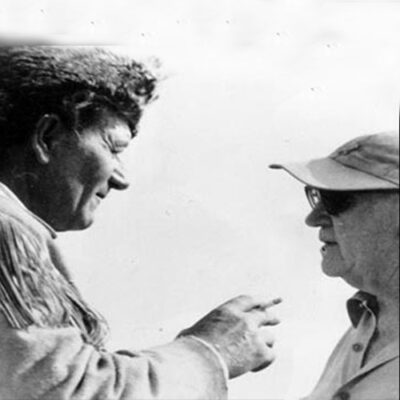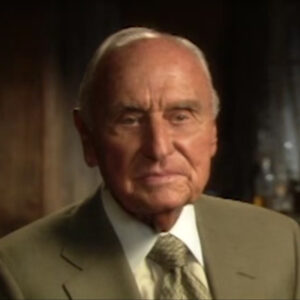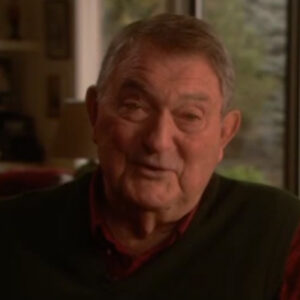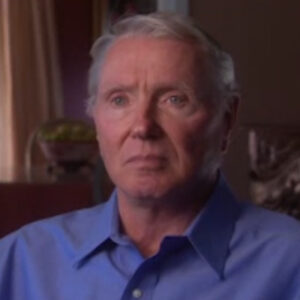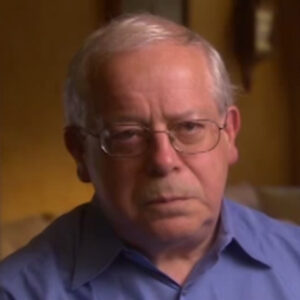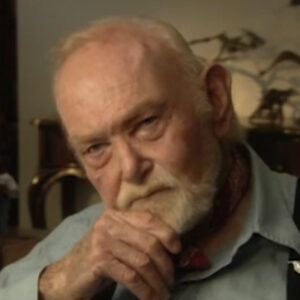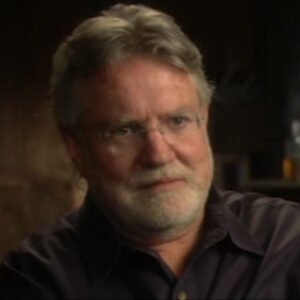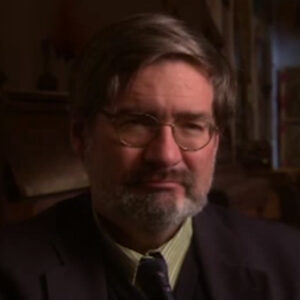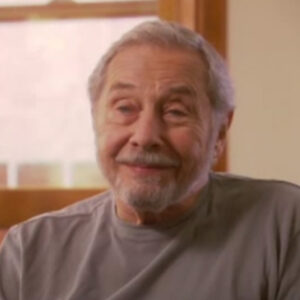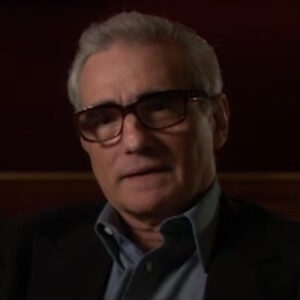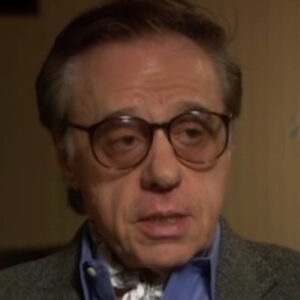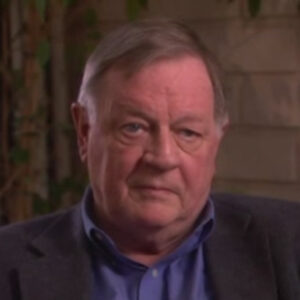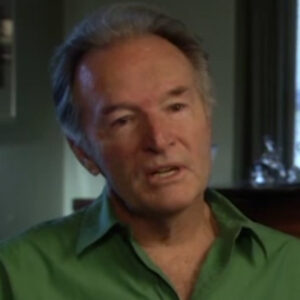Speaker I think the big influence on Ford of Francis Ford. Ford said he was the only filmmaker who ever learned anything from he was his apprentice, his his assistant for three or four years. And he learned everything. I don’t I think very few directors came to Hollywood and had that kind of education in how to make films from the ground up, every aspect of filmmaking given to them. So Francis gave him his basic education and film. Now, in the films themselves, aside from certain resemblances of composition, say, or a certain kind of Irish knack for having humor combined with serious subjects. I think the main thing, the chief thing is a question of attitude. Francis was a great experimental mentor. He was always doing strange things, weird things that would have been.
Speaker And is that OK?
Speaker OK. I think the main influence of Francis Ford and his brother Jack was this love of making movies. Francis loved making movies for the fun of making movies when he stopped being a big star. He used to go out and with a bunch of friends and they would make a cooperative one person to direct. The next person writes a script. They were all playing the things they would share the money together. He loved making films. He gave this attitude to his brother, to love making films and to experiment. I think that that John Ford is the great experimental filmmaker in the history of cinema. No one else to me is as inventive and creative. But the second thing that goes with this and that is that Francis Ford’s credo was make the audience glad they’re watching your movie. And I think this is a general of a real quality in John Ford. He makes you glad you’re watching the film. So Congeniality in the movie that invites you in. And so you have these two things together that are usual opposites, a film that’s very entertaining, very congenial, on one hand, a film that’s very, very elaborate and invented and and worked, on the other hand, of both of those ideals that fought for the cross country.
Speaker Cheney experiment.
Speaker Well, the dinner scene in, say, Stagecoach would be a good example because the camera angles and the point of views are very elaborate and very, very experimental in their way of entertaining the end of the long gray line where the people from the dead come back suddenly in this strange review, extremely daring thing to do. It’s it’s it’s hard to think of of another major studio film of that kind of money that takes such a risk end up and told her disaster will evolve with the idea for the patsy when John Wayne goes to the window.
Speaker And he’s doing this sort of the monologue about the soul.
Speaker So you think those experimental.
Speaker You mean because he uses the double exposures, but he uses the same thing in Judge Priest in 1934 where the the the Henry V Walther’s on the stand and telling his tales of the civil war and you see the the double exposures. I think that’s that sun cinema technique. That’s I wouldn’t that’s not the kind of experiment. I mean, that’s part of it. Because you love if you love making films, you tend to do kinds of that kind of thing. Put in double exposures. Francis Ford used to explode five or six, five or six different images were exposed in within one shot with with John Ford got a chance to direct and he started directing.
Speaker I carry some people who said that had become sort of the basic role model for the Ford.
Speaker He will anti-hero that John Wayne epitomizes and forth like a film sort of way out of it. How would you react to that?
Speaker Is use America or they’re working together on.
Speaker Sam, I think that’s a complicated question, if if I’d rather I’d rather if we could talk about that after question number seven, OK, if you want to come back to that. But I mean, you’re you’re assuming that Wayne is an anti-hero and or the Difford here was an anti-hero or not or the Harry Carey was.
Speaker And that’s and that’s I think we’re a long way from that.
Speaker I still have your take on that.
Speaker I Horsens 24 was which many people consider one of his epic films, whether you think he achieved as a director making a film with anything.
Speaker Tortured.
Speaker I don’t have anything, you know, I think it was a big public success, it made him. I’m sorry, I can’t I know it’s right next to you.
Speaker He I thought you said he was the Ironhorse.
Speaker I is not a film I love, I can’t I can’t really. Oh, well, I’m sorry I moved. OK, I’m sorry.
Speaker I’ll just get back here, get your reactions and feel love. I almost died.
Speaker I don’t want to talk about own horse. I like the iron horse. I’m not I don’t think it’s one of his great movies.
Speaker OK, in the 30s and late 20s or 30s right now comes to Hollywood because, you know, satirize. What was the influence of Bergdahl’s work on that boy?
Speaker OK, I think the influence of Murnau and Ford, first of all, to explain it, you know how an actor can play a role straight just the way somebody is walking along the street or they can use their body to express.
Speaker Emotion, they can become like a statue of Michelangelo, that they can express sorrow just by the way they hold their body, they can shape themselves. This was the first big thing that that Murnau its effect was on Ford. Ford’s people have tended to act, act, behave more naturalistically, this case, than this kind of very heightened, melodramatic way of expressing emotions. At the same time, sound comes in. So you have music and you know the difference if I’m simply sitting here speaking, whereas if you put the Battle Hymn of the Republic in the background behind me, suddenly everything I say is going to sound great and noble. Music can create this atmosphere that the words alone can’t do in the body alone can’t do it, can reinforce it, or can play against it, or can offer a different a dialectic. And then you take lighting and you take the set and all of these things enhance again the emotional, the emotion and the whatever it is that the that the actor this character is trying to portray and the character, the sensibility, the emotions, this becomes the center of the movie. And the set becomes so much of a part of the world that the character inhabits, that the set suddenly becomes a very deterministic thing often and for tomorrow. Now you have a geometric set, angles, squares, boxes within boxes. Then the question automatically comes up. Do the characters have any freedom or are they completely determined by the media? And this is dialectic between being completely determined and being human. The individual freedom becomes a big part of Ford’s cinema, and it’s a very Irish Catholic thing, because if you believe that God is all powerful and and that he has a plan for us, but at the same time you’re free. And so you have this kind of tension between community, the society, the laws, the conventions and the individual.
Speaker Zerega.
Speaker In your book, you sort of describe in that’s what you describe for this period when he was doing the film for Fox, you know, as a very fertile period. And when you compare it to the films he was doing sort of independently, like lost control and being former, what was it about that first period when Ford was under contract to Fox that makes those films so important?
Speaker I think that if if Ford had died in 1936, he would still be worthy of a very high place in the pantheon of film directors. I think that that Ford’s career had its ups and downs. And I think the main reason for these ups and downs had to do with him himself. I think he went through periods in his life when he was on a roll, when he was enthusiastic, things were going well. Other times where there was disease, death, all sorts of personal problems. He was a functioning alcoholic. My vision of Ford is that after each film, he would get roaring drunk, go on a binge and sober up and then put himself totally into the movie night and day. He would come home at night and listen to me in the dark music of the period, he would compose the film in his head, not on paper. It’s the amazing thing. You have these elaborate cutting sequences with all these camera angles intertwined. It was never done on paper. It was in his head. He completely lived and died. The film and the people who were making it became his his family and the film it and he would get drunk and then it would repeat. It’s no wonder that his body broke down in his late 60s. So I think that the I don’t see Ford so much as as films getting better and better as it’s going sort of Hillendale, certain crests and I. Are there differences in these movies, but. I think that the only the early 30s films are so great.
Speaker Very nice. He does Stagecoach, that’s Mr. Lincoln, Tobacco Road, Grapes of Wrath. Making celebrate this period of Ford’s films is some of his greatest achievements. What was it about these films that makes them stand out and how did.
Speaker Well, if going back to Murnau, if you take the idea that Marino’s idea was the cinema could be art. I think that Ford had never had this had never occurred to Ford before. He was making films, as we say, for entertainment. I think Murnau showed Ford’s cinema could be art within the next quest you come in is to OK. So I’m an artist and I get to talk to people, to masses of people for two hours in the dark. Well, what’s the point of my life, why am I doing this? Can I can I make this into something worthwhile? What’s the point of it? In the 30s, the big film, the 40s films are introverted. They’re looking at the United States. You see in small towns the nastiness of the American character. They’re very unflattering pictures of America and Americans and the myths that we live under, the way we control the intolerance, the racism, the militarism, the chauvinism, the patriarchy, the sexism. All these qualities are brought out in inforce films. People accused Ford of having reactionary old fashioned ideas toward American blacks, for example, but the fact is, if you look at most 30s American movies, you’d never know the sorts of things a black existed in the United States. They’re not there at all that they are in Ford. And they’re they’re deliberately in a controversial manner to get people mad, to get people excited, to provoke people. Now, in the scene by 1940, however, things had changed. We were going to get into the World War, Ford starts thinking more about, well, maybe I shouldn’t be talking all about how terrible America is. We have to get a more international vision, a more global vision, a bigger vision. So it becomes they become more serious in that respect. There’s the great you know, the great thing in Stagecoach. The overwhelming impression, I think, of the film is the horizon, the sense of limitless space that were going into some great future. The stagecoach is going into the future. It’s going into the horizon. At the end, we go on the horizon. It’s the same thing, really. If you look at young Mr. Lincoln, he goes into the Ryazan at the end or Grapes of Wrath. They’re riding into the future, maybe to make the revolution. How Green is my valley? We’re going to the whole film films about leaving the Valley growing up. So this is vision of America expanding into the world, which which is maybe a combination of sorts in the Battle of Midway. If you look at the Battle of Midway, you know, that was the turning point in the Pacific War. And without being too melodramatic, you could say this is the moment when the United States became the the American empire started. This is the moment when the United States became the great power and big moment transition and Ford was there filming it. So I think you have this vision. And at the same time, the this experimental side of his films, I think increases much more. The earlier films, more actor centered. He’s now much more into camera angles and lighting and creating a whole music drama world. Often, I think films like How Green Is My Valley or State Coach. To me, they’re the sort of Irish Catholic miracle plays their battles of good and evil. And yet they’re they’re they’re very formal, elaborate, and yet they’re constantly into the emotions of the people and how people relate and talk to each other and deal with each other.
Speaker To make them more sure.
Speaker But I think of Wayne as the hero, which answers your question seven.
Speaker Oh, no, no, you can.
Speaker I talked about the you can ask about Midway, but I’m going to really give you that. Yeah, but I got a three word answer for your question, which I love, which is why you say, why did he achieve all this? And I threw her and she’s mad.
Speaker Crazy mixture, you see.
Speaker Why did you said mad crazy makes you say to get mad.
Speaker Crazy mixture. Ford was Ford. You know, we talked about all this Maranhao stuff. One of the great things about Ford is that when the first time you see a Ford character on the screen. You immediately feel, you know, almost everything about them. People call this typing, it’s not typing, it’s the person comes with their address in a certain way and it always gives them a certain business, whether it’s taking a cigar, their mouth or flipping a cane or something even more outrageous. But the point is, within two seconds, you know this character, you know them. And then from the rest of the movie for can flush this person out and make them come through as a full individual. But the important thing is, you know, they are not anonymous and they have a cultural baggage. If it’s someone German, they have all the characteristics of the German. They represent an ethnicity.
Speaker So Ford can do like Chekhov and he can have 12 or 15 characters in a movie and you recognize them and you can have these interplays between them. And each one can have a different sensibility, a different personality, different physical actions. In his film, seven women in each of the women speaks at a different tempo. And Ford can mix these things up. And he does the same thing with emotion. So one moment it’s serious, the next moment it’s comic, the next moment is tragic.
Speaker The Maximino slapstick. You can mix all these things up in rapid fire succession and in Battle of Midway. It’s very condensed. And so my crazy mixture.
Speaker This question last, I didn’t have any of those. So this may throw you. I don’t think it will.
Speaker OK, we got for the Navy right wing doesn’t serve in the Navy. Some people have said that Ford never let me forget that in some way that and wait into the super patriot that he later became in the late 40s, the Cold War in the 50s.
Speaker How do you respond to that?
Speaker I have. I’ve never heard any of that before. It’s all new to me. After what year after? See your film and find out more about this. No, I never heard that 40s east about that. There’s there’s one letter, a song. But put it I mean, it’s a sarcastic line letter. You wrote his wife. Maybe that’s the source of this. But I mean, I wouldn’t take one sarcastic line from for it and build it into the whole. Obsession driving John Wayne throughout his career. It’s maybe just maybe too much. I mean, I don’t know, but maybe you got this from Wayne, but I’ve not I’ve not heard it before. I’ve not heard it before. Wayne was an actor. He didn’t have anything to do with his life.
Speaker So we got interested in politics to try to do something meaningful. And he would go to meetings and give speeches. And Ford made movies. And I think it was not you can’t say it was not a political person, but he was not the sort of person who went to meetings and read books and gave speeches. He put his thoughts where he put them into his movies.
Speaker So so it was him, not me, but for those some people who think that the way person. Was created by John Ford, how do you respond to that?
Speaker OK. Can’t be question number seven.
Speaker I think people think of Wayne as dominating a film and also he had a reputation for pushing everyone around on a set.
Speaker He was not the director, but he always acted as he did. This is the Wayne of the 1960s. If you look at his first seven films for Ford in all of these films, except she wore Yellow Ribbon, Wayne is in the background. He’s the secondary character. He’s the supporting character. He’s not the center of attention.
Speaker He’s one of the he’s one of the group, even in the quiet man. And Wayne complains that he had all he was surrounded by all these leprechauns and Minnehaha and dashing. He had to be the straight man who does nothing. Well, fact this is, I think, one of Wayne’s great talents. You can put a scene with dancing elephants and naked women and war going on. And Wayne can be in the foreground sipping coffee. And you will watch Wayne. He had that whatever that quality is that some actors have, that they draw, they draw your eyes to them. They make you get involved in their body language. I don’t know how he did it.
Speaker He could do it. Maybe he wasn’t a stage actor, but he had this quality.
Speaker And when we watch Wayne so, you know, I just watched a couple weeks ago, Wayne is rusty and they were expendable.
Speaker And as Kirby York and I always find that he’s a subletter actor in those films, that when he’s in his own films like this guy, The High, the Mighty.
Speaker Well, maybe. Well, I don’t buy. You’ve mentioned three films that I watch. I don’t watch. I think I lousy movies. I mean, and and the notion that that Wayne can be possibly be a more interesting character and a lousy movie than a great John Ford film is just not acceptable.
Speaker And I don’t find him at that much and not interesting in those movies. But yeah, I mean, for the past, he’s a perfect example. The main character is Henry Fonda. And after that, you’re interested in Shirley Temple. And Wayne is this kind of person in the shadow who, as you pointed out, emerges at the end, but he’s in the quiet man does the same thing.
Speaker And then comes the searchers. This is the fourth film in which clearly Wayne is the dominating character dominates the movie. Everybody hangs on him. Now, this was not the first such show in Ford, and it was not the first Ford that had this magnificent epic of American history. You get all this and the Henry Fonda films before the John Wayne show. And for this Henry Fonda hero, young Mr. Lincoln, My Darling Clementine, The Grapes of Wrath. And he’s always this Christ like figure. He takes on our sins. He suffers for us. He redeems us. And my Darling Clementine is also the great myth of the American West. And this hero, he I mean, Henry Fonda strides through the film. So this all this existed. The difference in the searchers, I think, is not just that Wayne is this great, he’s the great American hero, but also that he flops around Monument Valley like a helpless giant. He’s almost like a son of America in Iraq. And he’s totally he’s totally obsessed. He’s pushed by his own obsessions, lopa, anything, anything of reality, and yet at the same time, he never loses his dignity. He never loses the kind of raw innocence in that movie, he’s a bit like King Kong if you want to make a joke of it. And I think that’s the great thing in the searchers. It’s the tension between this great hero on one heart, one side and the helpless idiot on the other side. This that this is maybe the American myth in that movie.
Speaker And I think that’s typical of Ford. You know, I I couldn’t figure out a way to do this. That wouldn’t sound ridiculous, pretentious, pretentious. But when I wrote my book, I always wanted to to title that dialectical cinema simply because in Ford’s is always, well, you know, the Irish always arguing we can’t resist an argument. Everything in Ford’s films is an argument. Nothing, no ideas ever proposed that at the same time he doesn’t oppose the opposite idea.
Speaker And this fantastic tension in searcher’s between his two aspects of Ethan Edwards, his character. He’s everything written about America and helpless about American rejection of our Americanness, everything great about America all at the same time.
Speaker So does that strange contradiction in the Wayne character. But then if you look at subsequent Ford films, he brings Wayne down to size. The next movie, Wings of Eagles, he’s a paraplegic. He can’t even move history and spends half the film stretched out on a table on his stomach. He has to act with his bare back in Liberty Valance. He’s in a coffin without his boots, without his gun. And Ford did the same thing to Mr. Tutu, to Henry Fonda, in a sense. He also brought him down from this Christlike character in Fort Apache. He’s a he’s a martinet in Mr. Roberts. He’s very, very full of self-doubt. So I think Ford tried to bring forward trying to bring John Wayne back into the the chorus, as it were, having made him the big hero in in the searchers. And the other thing is that the relationship between Ford and Wayne was quite different than the relationship between Ford and, say, Andrew McGlocklin, who directed a lot of his his his, his, his, his movies. Ford was a father figure to Wayne.
Speaker And I think Wayne was quite intimidated by Ford and he felt like a son with him, that he felt subservient, that his fragile. Wayne in Ford’s movies is a fragile guy, not at all.
Speaker So to me, there’s a tremendous disconnect between John Wayne as when people say this and between the time when Ford films, because I mean, Ford films, this is very fragile, very vulnerable, somewhat confused person.
Speaker Plus, one second to.
Speaker Where you can see that sign went on to say all that before trying to talk about Harry Carey there, but but let me let me give you that a question I can take you into, OK?
Speaker You wait till he starts or which you might as well.
Speaker So at the end of the search is now, you know, where does the Harry Carey gesture?
Speaker You know, they are. Exactly.
Speaker What was the connection there for for Kerry to weigh in on this when he won the title of hero anti-hero protagonist?
Speaker As I said, I think the big influence of Francis Ford when Ford was that you make funny, you make movies for the joy of it, for the for the fun of it. And you make them as a group of friends. And Francis Ford made films at Universal. They had a unit they used they made like 20 or 30 movies with the same players, the same scriptwriter, the same cameramen. They were scripts themselves. John Ford bought this method of production as much as he could into the Hollywood studio system where he had his family, his people that he would bring back from film to film. It was a gathering of individuals. The his first he made 20 something like, I think, 25 films with Harry Carey doing a lot. This time he lived at Harry Carrey’s farm with Harry Carey and his wife. He was out in the alfalfa patch, they say. So this was kind of his family and Harry Carey played often in his films A Good, Bad Man, and he would often arrive in the film from nowhere and disappear at the end. And he would make this gesture when he would walk away at the end of the.
Speaker Again, this is the kind of gesture he would he would make this gesture at the end as he walked away, the there’s a kind of master plot in Ford’s movies. It’s not in every film, but sometimes parts of it are. You always have a community, as I talked about before, with all these this ethnic diversity is never just a community of of of one type of people. There’s always ethnic mixtures and class conflicts, vertical and horizontal of every sort, and thus a situation of intolerance with people being persecuted. And we’re always almost always in front of families being threatened to families being broken up. The hero is somebody who arrives. He always arrives. This is always the big moment of fate. He come, he runs, comes in on a horse like the searchers or he arrives in a boat or he comes on a train like Liberty Valance. You’re always arrives into the community. The hero is a Christlike figure. He has higher knowledge. Somehow he knows right and wrong, and he mediates the intolerance. He reunites the family. He imposes a New Testament, as it were, often by force. And then at the end, he walks away again alone. The hero was always celibate, at least at the time of the film, sometimes a widow or so, in one case a Shirley Temple. So she’s celibate. And because he some somehow has this kind of priest like qualities of being outside of history, it’s the way I see it. And for it, that’s how they have the higher knowledge. They’re sometimes tuned in to something the rest of us don’t feel like. Abraham Lincoln is a I think, sort of of the maybe the Difford hero of this person who somehow has a higher knowledge of right and wrong and mediates imposes a New Testament, in this case, a whole new reading, the Constitution.
Speaker You fought after the war. Is a different director.
Speaker I mean, some people think of these questions that the trilogy, the five Westerns, he did, you know, wagon master, three godfathers. What about the other two? They think it was just genre pieces, but.
Speaker From my perspective, very intensely personal, Phelps, who was fired after as a director after the war, what was he trying to do with his cinema?
Speaker Well, took decision, whether it is a question and a supposition. I’ve I’ve never seen what was such a sin about being a genre piece. I mean, Mozart’s operas are genre pieces back and Bach’s cantatas are genre pieces of Beethoven’s symphonies, genre pieces. I mean, I think it’s it’s great to do is on a piece of you paint a crucifixion or nativity scene if you’re Leonardo da Vinci or Michelangelo, you don’t say, guys, I want to do a genre piece. It’s a great opportunity to do a crucifixion or nativity. I mean, you get you get to treat a theme that’s been around for 2000 years and to see it from the point of view and now and today and have me and put your own stamp on it. And everybody to an extent can understand what you’re talking about.
Speaker I mean, John was wonderful. So that’s the.
Speaker I don’t I don’t know that Ford was trying to do anything that much different in his late films than in his earlier films, people talk about a darkening vision. I don’t buy that. I don’t think Liberty Valance is darker than Stagecoach. What could be darker than The Grapes of Wrath? Magida Ford means The Grapes of Wrath is his last film. Everyone said, see, he’s lost faith in America. There’s no more hope in America. He’s seen that the horrors of the class conflict he’s seen, he’s he’s completely bitter about America. But he made the greatest wrath in 1940. And if you go back, as I said, to to a film like Pilgrimage in 1933 or Dr. Bull, I mean, you can’t you can’t fly and find portraits of the whole town’s talking. The whole town’s talking that we live in a police state and the politicians are no different between the politicians and the gangsters. You just can’t find black or pictures, black or critiques of America. If you’ve made these films in old age, the people who interpret them that way, I don’t I don’t see I don’t see Liberty Valance as any reversal.
Speaker So you don’t buy the fact that Liberty Valance things have changed in this country politically. His health was was not the best and he was not in the best shape that this all informed this.
Speaker Well, I think as you get older and you know you’re dying, sure these things are going to affect you. But I don’t the the notion as he puts Wayne in a coffin, therefore he no longer believes in the American hero. But the American hero is flawed from the very beginning in Ford’s films. He’s always flawed.
Speaker No, I’m just saying, yeah, I mean, my darling Clementine, I mean white. Sorry, my darling Clementine Wyatt Earp becomes a marsal just to get vengeance.
Speaker This is whole point and he ends up getting all these people killed. There’s this as I said before, there’s always the idea and it’s opposite. So I don’t think that I don’t think that it’s of course, I mean, you see Liberty Valance and there’s John Wayne in the coffin. Yes. So and John Wayne has these these these ideas about him.
Speaker He represents the American hero and now he’s in his coffin. So. Sure, but you can you can find these things already in the 30s in John Ford and and certainly in Stagecoach.
Speaker I mean, you know, at the end they arrive at the end of Stagecoach. John Wayne rides in to the sunrise with the girl.
Speaker So you say this is a happy ending, but it’s not a happy ending because they say, hey, they’re safe. And the blessings of civilization, everything, the town is rotten. The only way you can have a happy life is to ride out into the desert, into the sunset, because you’re not going to find it in an American city in 1939. And moreover, you have to be a God. And John Wayne is a God. I mean, he saves three bullets to kill three people. And if he missed once he’s dead, that he only needs three bullets. And it never occurs him to doubt that he only needs to be able. So that’s that’s the guy type of guy who gets to ride into the sunset with a girl. If that’s a happy ending. You know, there’s a whole slew of happy endings in Hollywood movies in 1939 that aren’t happy endings. I mean, even even The Wizard of Oz, I mean, it’s it’s really the whole thing collapses. The wizard is a phony. She’s back in Kansas. And somehow it’s a happy ending. I mean.
Speaker Generation of young people a day. So, as you said, John Wayne, John Ford, they think of them as the same person politically. You know, they think of the politics. They think of the 60s and Vietnam. You know, I mean, you understand the difference between these two men.
Speaker Can you tell this audience? Well.
Speaker I think John Wayne talked politics and politics and active politics, and I think John Ford made movies, I don’t think he was the sort of person who follow politics that closely. I think he was quite cynical about it. I think he put his thoughts into his movies.
Speaker Yeah. As he got older. I think he got more and more disconnected.
Speaker If you see supposedly in the 30s and 40s, he was kind of a Roosevelt Democrat, a bit on the left. He was willing to send money to to the communist faction in Spain.
Speaker He was he made The Grapes of Wrath.
Speaker He in the famous story in Grapes of Wrath, of course, is that it ends with this this this idea that somehow the family is going to be helped to be resettled with the aid of the federal caps and federal programs. But that was added on after Ford left the picture.
Speaker And that’s important to know. When Ford leaves the picture, everyone is dead, the family is destroyed. And the hero, the Christ figure, Henry Fonda, is walking up the mountain to start the revolution.
Speaker And if it had made in Russia, you would have the international playing at that point. That’s Ford’s ending to the film.
Speaker But I think this is because of his origins. You know, he came from an immigrant community. He grew up in Portland. He lived in a family in a house that had three families. One of the families was black. One of the founders was Jewish. There was this ethnic thing and they were always at the bottom of society. People don’t realize that for the Irish in the United States in the 60s, very much like the blacks in the United States, they were the despised thing. You couldn’t buy land in in New England, you couldn’t get jobs. You couldn’t marry a wasp. So Ford came into a situation where when he was young, he was a victim of this kind of racial intolerance by the time he was died. Kennedy.
Speaker Kind of like the president and he made this statement that he never really felt like a like an American for America until an Irish person had become president, because there was this people forget there was this prejudice against the Irish, against the Catholics. So he identified with these type of people his life at the end here, he became very reactionary. I think he thought was a complicated person, very complicated person. And he was many things to many people. And I think part of him was this great artist.
Speaker And part of him was the sense that maybe movies are important. Maybe the important thing is to have a naval career and make his wife proud of him. And because she thought hard, it was kind of trivial.
Speaker And and, yeah, I think toward the end of this year, he lost he lost vision. The curious thing is when he got involved with the film about Vietnam. He made he made the propaganda, he didn’t make the reality, he made what we were saying it was, and by the time he made this film, it was so embarrassing that even the U.S. government didn’t want it to be shown, like, say, he had made a film of today about Iraq and he had gone to Iraq and he would show how democracy is taking root and and everyone’s so happy and blah, blah, blah. And this is great. Great. I think even the White House at this point would be a little bit embarrassed to distribute such a film. Yeah, I think he he was a bit out of it at that point, John.
Speaker As I said, good. There’s no rainstorm going good.
Speaker So getting back to Fort Wayne Harrison, so even though Ford became disgruntled by the time he was getting close to his last breath, you would equate that politically as the same man.
Speaker I to me, they’re night and day, I think with for this, there’s always this as I said, this is great sympathy, first of all, for the underdog. You know, when he made his film, This is Korea, which is a documentary about the Korean War, it certainly doesn’t question the ethos of the war. Quite the contrary. It uses the kind of Cold War jargon of the time in such a way that it becomes self questioning. I mean, this is such a vast subject, people.
Speaker No other filmmaker is is held so responsible for his supposed sins as John Ford is. It’s incredible. You look at Hollywood and there is one right wing fascist after another making films, one racist after another, making films. And none of these people are conscious of being held up and called these names for it’s constantly being called racist, militarist, chauvinist, sexist patriarchy. Every every possible thing wrong with him. And I it’s not true.
Speaker It’s the Irish in him. Even in the 1930s, Ford was being.
Speaker This was being done against for these things were being said about him, and I think he did it deliberately, he wanted to be provocative. He wanted to to provoke people. Take the quiet man.
Speaker You should a quiet man today and you immediately. It’s like showing the birth of a nation you can’t. And he showed the birth of a nation. You can talk about anything else other than racism. So the quiet man, you can’t talk about anything else than. Right.
Speaker Than John Wayne kicking in a house on the roof. This is just absolutely unacceptable. There are people who see this movie and they refuse ever to see John Short film again. The man is condemned. But I mean, how many films have you ever seen about wife beating?
Speaker So the only the only moments, the only film in the history that’s ever made a controversy out of wife beating, why? Because it shows you how wife reading can exist and B, improve approved and supported by a culture. It shows you how it’s part of the fabric of the people. This is unacceptable. People in movies want want baddies to have black hats. You can’t what’s unacceptable in inforce films in the South that his his his southern racists are people who in almost every other respect are saints. They’re wonderful people, but they’re racist. This is unacceptable.
Speaker You have to make everyone all white or black. But that’s not that’s not unfortunately, that’s not the where evil comes from in John Ford there terrible creatures, but generally most evil is the evil of good intentions.
Speaker Gone, gone astray. Good intentions gone to extremes.
Speaker Let’s get to that point about him being mean when people get those the trilogy for the particular with and we a bad day, they only see this film about the military.
Speaker But it’s much more what was what was played across in those films.
Speaker Fort Apache is is a good case in point. On one side, there are these people who see the film as an apology for the for the genocide of the Indians and excusing it. And not only that, but excusing the lie of history for some reason. When when John Wayne. Well, I don’t have to explain the film. I hope or explain the whole background of the film. OK, when when John Wayne says, yes, that’s how it was and makes a hero out of Thursday, because it’s more important to print the myth than reality, people say, oh, John Ford says that it’s more important to show the myth than the reality. But for showing you the reality, he’s he’s showing you that the myth isn’t true. And somehow people missed that. That’s the point of the film. The amazing thing about Fort Apache is that you have this you’re this group of people who live in this fort and you don’t see them, just the soldiers.
Speaker You see them as fathers, you see them as husbands, you see them as wives. You see this group of ordinary people who have are really nice people. You’d like to know them. They’re friendly, they’re funny, they’re humorous, they’re not robotic. And they like the Indians. And when they’re told to ride into this canyon, no one, they know they’re going to get killed. Number two, they know the Indians are right and they’re wrong and that what they’re doing is murder. And yet they follow the command. Why do they do this? This is the question of the film. This is the question, why is it that what is the mechanism that makes the society unite and do something like this? Why do people fight wars? What makes them do these things? Ford makes a film like The Long Gray Line is a wonderful scene where it starts West Point. The Irish immigrant, the Prunier outsider for Ford walks up Irish Amawi walks up to West Point, looks in the gate and sees the cadets assembling. And he says, What is this, a prison or some kind of lunatic asylum? And the guard answers, he calls him Paddy, which is a racist term. He says it’s the United States Military Academy. Well, all three answers are correct, and this is the theme of the film. West Point is a prison. West Point is a lunatic asylum at West Point as the United States Military Academy. It is sublime. It is wonderful. It is magnificent, is heroic. But it’s also horrible. It’s ridiculous.
Speaker It’s terrible about the way and Wayne’s performance.
Speaker He never kills an Indian. He’s the he’s he never goes an Indian. He’s the he’s the old man who’s lived through the civil war. Now, here’s another similarity. I mentioned Iraq before. He’s notorious being like the U.S. in Iraq in in. The yellow ribbon rain has been through the civil war, he’s seen killing, he’s seen mass slaughter. You know, this war is he does he spends the whole film doing everything possible to avoid war there. One encounter with the Indians. He says, shoot of the hat, men scare them away. It’s the young men who are constantly want to go out and fight and kill people. When somebody who’s had experience, who knows what war is.
Speaker So that’s, you know, how does that square with the John Wayne who wanted to go to Vietnam? Well, doesn’t mean they’re completely different people. And that’s the difference between John Wayne and John Ford.
Speaker When John Ford’s people go off to war, they go off, they’re tired, they’re weary, they hate their officers and they have not at all sure what they’re fighting for is worth the sacrifice. There’s none of this gung ho. Here we go.
Speaker Great, handsome Oscar. Though he doesn’t have the.
Speaker Well, ask the question if you I know you’re not going that you don’t have to answer the question since it’s not going to be there. So I guess the answer to the question is likely to be the NSA is very conservative about the way you think it was to be director power.
Speaker It is extremely limited.
Speaker You know, they understand this. And he didn’t he didn’t buy the idea.
Speaker It was concern for the public.
Speaker Poet laureate David Thompson is David Thompson does not like for David Thompson, thinks the screen is the great film. And he’s outraged. He’s really outraged that that’s how Green is. My Valley won the Academy Awards and Citizen Kane, and he’s never given for it.
Speaker He said that he when I wrote about how Green was my valley, I started the chapter quoting him. And then we’ll just sort of against him because I don’t think there’s any comparison between Citizen Kane and how my reality either I think I found is like Years Beyond Citizen Kane is a work of art.
Speaker So but David Thompson did a great review to my book and said it made him want to see all the films again. So give him that. But no, he hates for it. It’s his his paragraphs and for the diatribes. He’s a mad man on the subject. It’s like listening to George Bush and Saddam Hussein. It’s nonsense.
Speaker If if if poetry means cinema is art, then I think John Ford’s poetry. But I don’t know. I have no idea what he means by poetry. That’s my answer. OK.
Speaker I thank you for giving it to me. I mean, you don’t buy this notion that would translate into a super patrão made way more difficult, whereas rain a patriot, and that’s when not so much rain a patriot, just the quest.
Speaker I mean, he’s he’s not this there’s no such there’s no such film in Fort Apache. He’s the one who’s who’s against doing the fighting. He’s the one who takes the Indian side. He’s the one who says, I made this agreement. Now you’re breaking it. He’s the he’s the good guy.
Speaker He’s not killing Indians. He’s not killing Indians. And she wore a yellow ribbon. And he’s he’s not why we said that before. He’s not killing any Indians.
Speaker We’ve got scurvy or in Rio Grande.
Speaker Then he rescues the schoolchildren. He doesn’t go around killing Indians. I mean, this isn’t the you know, I mean, in California, you could you could earn a living by bringing in the scalps of dead Indians and turning over to the local authorities that pay you a bounty of every scalp and didn’t matter if it was the scalp of a two year old or a three year old child. That was that was fine. That was great. That was encouraged. We do everything possible. We want to get rid of them.
Speaker I mean, you don’t find that in Ford and.
Speaker I mean, the efforts of John Wayne, the Green Berets, I mean, this this this does not exist in 400 of these these if there’s a young man who wants to go off to war and kill for glory, he’s he’s he’s like booted in the past. Like, he’s he’s a fool. He’s in for it. He’s he’s he’s depicted as a, you know, crazy young lunatic.
Speaker But for that offensive, for the eight year old man goes off into the Navy. Yeah, he went off carrying a camera, not a gun.
Speaker I said I’d try to speak in unadoptable soundbites, but somehow some people believe in the way that that Ford’s been in the service somehow because we saw him as a father figure.
Speaker Had some impact on Wayne’s own notion of himself and who he was and what he later became when he became president, the Motion Picture Alliance, and he became such a rabid anti-communist.
Speaker Look, I I don’t know Wayne’s psychology, we we are waiting for the tell all book on John Wayne and it’s going to be history of all sorts of of of problems that actors traditionally have. I mean, actors are good actors, partly because they have so little life off screen. They live in their characters. They become the people they play. If they were, you know, fully formed human beings, they wouldn’t engage in such nonsense. And they try to compensate. I for did not take did not take John Wayne or whatever, and he did not take them seriously. And Harry Carey and I’m sure told you some wonderful stories about that. We would say what Bond is, but he is our. Or something like that.
Speaker I think it was another less, less acceptable term for it, and he he he he was willing to be friends with these people, but he didn’t take their politics seriously.
Speaker He during the oh, it’s in my book, there was this guy I remember his name there. There was a guy who was had some kind of communist past and it passed in the 50s and he couldn’t get a job in Hollywood. And someone mentioned it to John Ford. And John Ford said, bring the commie bastard to me. I’ll give him a job.
Speaker He wasn’t into that, and Ali has a story about how he got people off the blacklist all the time, he was getting them, getting them jobs, helping them, he didn’t he didn’t operate on this. The whole theoretical level of John Wayne’s politics of Ronald Reagan, of this sort of thing that wasn’t where Ford was operating. Ford was making movies. He was putting his thoughts about political issues into movies, and they were deep and they were complicated and they were conflicted and they were multisided, he wasn’t out there on a on a on a sitting on a soapbox saying, you know, war against communists. This is just night and day.
Speaker Good answer. My last my last question, if one had to.
Speaker To define John for John Wayne relationship from Stagecoach through Who Shot Liberty Valance. How would you define.
Speaker Well, I say I think it’s the kind of father son relationship and Wayne is subservient to Ford and therefore he’s vulnerable. He’s he’s fragile. He’s more like a son. He’s not pushing people around. I think Wayne was willing to do whatever Ford wanted him to do. To me, there’s a total disconnect between John Wayne and John Ford films and John Wayne and other movies, particularly from the 60s.
Speaker I think one can make a case for some of the 50s films, Howard Hawks particularly, but the but he’s not the same character, just know that even in Howard Hawks, whom the person who was a generation older, I mean, you know, the very fact that Wayne was such an old fashioned reactionary person and a sexist and militarist and chauvinist, he was also an ageist. He respected people who are older than he. And he acted in a certain way toward people who are older than he.
Speaker And when he goes on a set neverwas younger than he than he was the he was the the big guy.
Speaker Anything you want to say about food that we all should know?
Speaker I think I’ve said everything I wanted to say.
Speaker We talked about how you can cut.
Speaker Yeah, so so originally we while it was it was said to direct me as my valley, how come it came about before it took over?
Speaker I think we might have got another job, another picture.
Speaker OK, thank God.
Speaker No, I mean, it’s it’s. Where is that question going?
Speaker It was basically what the Ford brings with it while and brought to it and made it a Ford film.
Speaker Well, this is this is a good this is the question I think that in how green was my valley, there probably was a lot more.
Speaker But.
Speaker I would have to think about this answer, because I don’t know what you think. Yeah.
Speaker In your book, you describe that period from for the 80s, basically.
Speaker Fifty six is for its mythic and epic period. Why this film?
Speaker Every culture is is is is ruled to a certain extent by ideas, by abstractions, by notions of what’s right and what’s wrong, which are often flawed. Racism, particularly in the United States, is is is was always. Conceived of as a question of right and wrong. This was the way things were supposed to be, tradition in Ford is almost always harmful. It’s strange for the Fords always being placed across one across the coals, branded as a terrible person, as because he celebrates tradition, tradition. And Ford is always inimical. It’s always harmful. It’s always torturing people. It’s always causing every sort of intolerance and terrible things. Ford shows these movies for these things. And it’s strange. People think that Ford is is advocating the things that he’s decrying. Ford is able to make a film, his service pictures the Wings of Eagles, he’s able to make a film about the Navy and the Army and Navy guys and Army guys go see this film. They liked them. They see themselves. But you can go see them from someone from a viewpoint such as mine and see all the all the problems within these things or the repressed homosexuality is quite they’re quite driven sometimes in these movies, the repressed violence than the friendly fight in forge the way the people go into a saloon and get drunk and start bashing each other. I mean, people see this as an example of Ford’s sickness. I mean, it’s a fantastic image of just, in fact, what exists. People do enjoy beating each other up. They enjoy this. They enjoy being a man, particularly maybe not so much today, but in fourth generation, being able to take it, being able to be punched, get knocked down and pick yourself up. This was considered a sign of macho illness, and Ford probably was guilty of it, too. But he also saw that it was kind of sick and ridiculous. And there’s this this interplay again. And for us that he’s not he’s showing you the ills of society.
Speaker This is going to be my last question, what does some of the themes that you find continually inform right after the master plan?
Speaker I answer that with the master plot and the master plot with the hero and and the notion of the society as being always having a culture and always having the stratification of culture in the class conflict and all that, any of that.
Speaker Yeah, OK. I think.
Speaker For his relationship with the women in is the only real Harris, you know, because was it for years and see women in his movie?
Speaker Well, why is it that the only director we sit around asking, how did he see women as John Ford? I mean, why is there something so suspicious about the way Ford looked at women that you that somehow no one else is guilty of? You look at Howard Hawks, his films. I mean, everyone is is isn’t writing in an orgasm from, you know, the whole through the entire movie.
Speaker And so people say Ford’s people are on on sex stories he doesn’t see. I think that’s nonsense that he wasn’t a woman’s director. I love his women. I love his women. You know, he made Mogambo, which I think is one of his really great movies. And which is very similar in a story is very similar for The Searchers, and in that film is Grace Kelly. And it’s by far their best role in films. She is the most interesting, complicated, charming, fantastic, and she got an Academy Award nomination. It’s a film that made her a star. Wasn’t Hitchcock to make this guy a star? John Ford. And in the film is Ava Gardner. And my God, it’s her best role. And she got an Oscar nomination.
Speaker And how can how can this man who who couldn’t do something wrong as it relates to women, he can direct Grace Kelly and Ava Gardner, getting them both Oscar nominations to work with her in HAVE.
Speaker And I think where a housewife is particularly in the long gray line, that’s the one I really like.
Speaker What’s the quality that you like so much of her that she has?
Speaker She’s more stylized. She’s, you know, most most actors when they’re with force, not just Wayne. Most actors with Ford are different in his films than they are in other films. You know how I can say this on film, but I mean, I think she’s kind of blonde over the movie. She’s in in Ford. She’s like Bewitched. She’s spellbound. And the more spellbound she is, the better smile, like in the long gray line. I mean, every everything about her is stylized. You know, people people say we want the typical reaction. You show a John Ford movie to a class of students today. The first one, they always say it’s not realistic. I mean, how reality is more reality outside my window than there is no other film has ever made. I don’t go to the movies reality. I go to the movies for somebodies vision of reality. Somebody somebody who’s going to explain to me what is or somebody is going to tell me about what it’s like for them to be alive or what it’s like for these characters, for the story world. I’m going for the fiction. I’m not going for the reality.
Speaker So, John, what does you.
Speaker What’s reflects in reality, of course, I mean, it’s ultimately all about reality, but I mean, that’s you know, we don’t have reality. We are human beings. We can never get outside of our own, of our subjectivity. There’s no such thing as objective reality. There’s only the human. Story, world of reality, and that’s what you go to a movie for, you go for the art, you don’t go for Isaak’s machine.
Speaker So you say you find this a. Fascinating, bewitching in the long gray line.
Speaker As you come across the wings of evil is quite bad.
Speaker I love Red Wings of Eagles because, again, they’re she’s very, very stylized, quiet manner. She’s magnificent. I mean, it’s the you know, in informed as I said, his films are Irish Catholic miracle plays. I don’t think you can exaggerate this too much. His songs are music dramas. They’re like operas. Stop thinking. In reality, he starts singing them as as things that are soaring into into heaven are. This it’s a miracle in in the quiet man when John Wayne sees we’re here for the first time, he looks and there’s this redheaded girl in the fields with the sheep. I mean, it’s. He never recovers from the whole movie, and that’s what for the same thing he has for us, the same scene in How Green Was My Valley, that over Dimitar runs around the corner and bumps into an alley. And it’s the same thing. Lightning strikes. My God, there she is. And it’s the same thing in my darling Clementine Clementine kiss off the stage and John and Clementine gets off the stage and Henry Fonda stands up and looks. It’s a miracle. This isn’t to say that Forche also saw women as as as some abstractions. I mean, my God, this is the way a human male sees human females as miracles. So what’s unnatural about this? He’s not defying them people. We defy women every day, all of us.
Speaker Gone. So you talk about Ford’s economy. As a director.
Speaker Well, I talked about how when as soon as you see a character in forward, the character establishes themselves so you remember them, defines himself in first, second, literally. And but Ford’s holding, which is so economic, most of his films are composed of two man sequences. And it’s incredible. First of all, how much he gets across in those two sequences and how. Often it’s done so indirectly, people will stop and listen to music, they’re spend most of the time reacting to things. One time someone was coming to my house and the I had to tell them how to how to work the alarm when they get inside the door. And if you don’t punch the code in the alarm within 30 seconds, all sorts of terrible sirens go off. I said, well, think how much John Ford can do in 30 seconds. 30 seconds is an eternity in Ford. It’s amazing how much how precise, just exactly precise he is. And nothing things. People don’t move in ways that don’t tell you things.

